Leonard Papenmeier
SMOG: Scalable Meta-Learning for Multi-Objective Bayesian Optimization
Jan 29, 2026Abstract:Multi-objective optimization aims to solve problems with competing objectives, often with only black-box access to a problem and a limited budget of measurements. In many applications, historical data from related optimization tasks is available, creating an opportunity for meta-learning to accelerate the optimization. Bayesian optimization, as a promising technique for black-box optimization, has been extended to meta-learning and multi-objective optimization independently, but methods that simultaneously address both settings - meta-learned priors for multi-objective Bayesian optimization - remain largely unexplored. We propose SMOG, a scalable and modular meta-learning model based on a multi-output Gaussian process that explicitly learns correlations between objectives. SMOG builds a structured joint Gaussian process prior across meta- and target tasks and, after conditioning on metadata, yields a closed-form target-task prior augmented by a flexible residual multi-output kernel. This construction propagates metadata uncertainty into the target surrogate in a principled way. SMOG supports hierarchical, parallel training: meta-task Gaussian processes are fit once and then cached, achieving linear scaling with the number of meta-tasks. The resulting surrogate integrates seamlessly with standard multi-objective Bayesian optimization acquisition functions.
Benchmarking that Matters: Rethinking Benchmarking for Practical Impact
Nov 15, 2025Abstract:Benchmarking has driven scientific progress in Evolutionary Computation, yet current practices fall short of real-world needs. Widely used synthetic suites such as BBOB and CEC isolate algorithmic phenomena but poorly reflect the structure, constraints, and information limitations of continuous and mixed-integer optimization problems in practice. This disconnect leads to the misuse of benchmarking suites for competitions, automated algorithm selection, and industrial decision-making, despite these suites being designed for different purposes. We identify key gaps in current benchmarking practices and tooling, including limited availability of real-world-inspired problems, missing high-level features, and challenges in multi-objective and noisy settings. We propose a vision centered on curated real-world-inspired benchmarks, practitioner-accessible feature spaces and community-maintained performance databases. Real progress requires coordinated effort: A living benchmarking ecosystem that evolves with real-world insights and supports both scientific understanding and industrial use.
Bencher: Simple and Reproducible Benchmarking for Black-Box Optimization
May 27, 2025Abstract:We present Bencher, a modular benchmarking framework for black-box optimization that fundamentally decouples benchmark execution from optimization logic. Unlike prior suites that focus on combining many benchmarks in a single project, Bencher introduces a clean abstraction boundary: each benchmark is isolated in its own virtual Python environment and accessed via a unified, version-agnostic remote procedure call (RPC) interface. This design eliminates dependency conflicts and simplifies the integration of diverse, real-world benchmarks, which often have complex and conflicting software requirements. Bencher can be deployed locally or remotely via Docker or on high-performance computing (HPC) clusters via Singularity, providing a containerized, reproducible runtime for any benchmark. Its lightweight client requires minimal setup and supports drop-in evaluation of 80 benchmarks across continuous, categorical, and binary domains.
Leveraging Axis-Aligned Subspaces for High-Dimensional Bayesian Optimization with Group Testing
Apr 08, 2025Abstract:Bayesian optimization (BO ) is an effective method for optimizing expensive-to-evaluate black-box functions. While high-dimensional problems can be particularly challenging, due to the multitude of parameter choices and the potentially high number of data points required to fit the model, this limitation can be addressed if the problem satisfies simplifying assumptions. Axis-aligned subspace approaches, where few dimensions have a significant impact on the objective, motivated several algorithms for high-dimensional BO . However, the validity of this assumption is rarely verified, and the assumption is rarely exploited to its full extent. We propose a group testing ( GT) approach to identify active variables to facilitate efficient optimization in these domains. The proposed algorithm, Group Testing Bayesian Optimization (GTBO), first runs a testing phase where groups of variables are systematically selected and tested on whether they influence the objective, then terminates once active dimensions are identified. To that end, we extend the well-established GT theory to functions over continuous domains. In the second phase, GTBO guides optimization by placing more importance on the active dimensions. By leveraging the axis-aligned subspace assumption, GTBO outperforms state-of-the-art methods on benchmarks satisfying the assumption of axis-aligned subspaces, while offering improved interpretability.
Understanding High-Dimensional Bayesian Optimization
Feb 13, 2025Abstract:Recent work reported that simple Bayesian optimization methods perform well for high-dimensional real-world tasks, seemingly contradicting prior work and tribal knowledge. This paper investigates the 'why'. We identify fundamental challenges that arise in high-dimensional Bayesian optimization and explain why recent methods succeed. Our analysis shows that vanishing gradients caused by Gaussian process initialization schemes play a major role in the failures of high-dimensional Bayesian optimization and that methods that promote local search behaviors are better suited for the task. We find that maximum likelihood estimation of Gaussian process length scales suffices for state-of-the-art performance. Based on this, we propose a simple variant of maximum likelihood estimation called MSR that leverages these findings to achieve state-of-the-art performance on a comprehensive set of real-world applications. We also present targeted experiments to illustrate and confirm our findings.
Exploring Exploration in Bayesian Optimization
Feb 12, 2025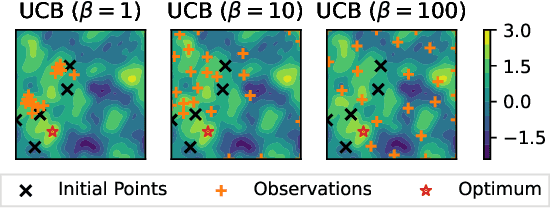
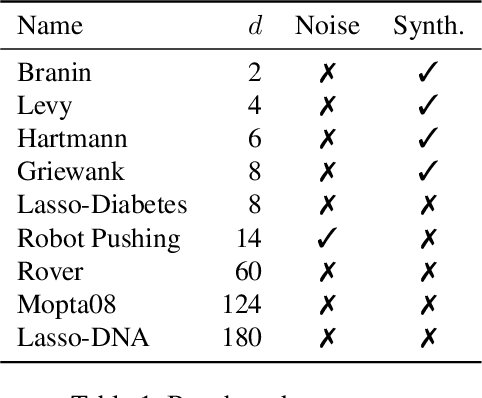
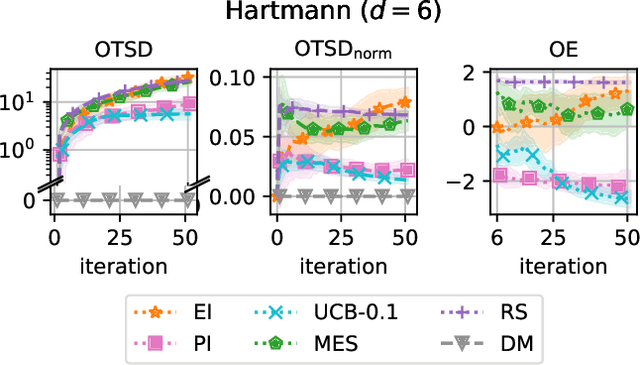
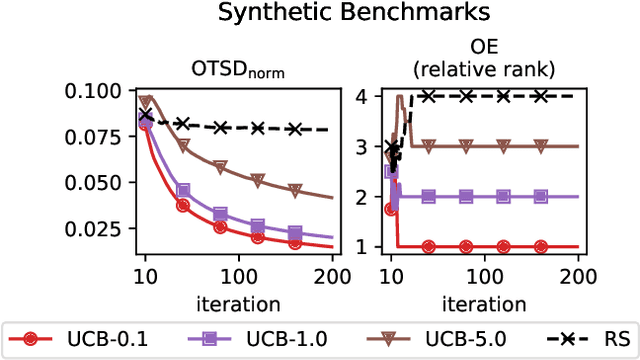
Abstract:A well-balanced exploration-exploitation trade-off is crucial for successful acquisition functions in Bayesian optimization. However, there is a lack of quantitative measures for exploration, making it difficult to analyze and compare different acquisition functions. This work introduces two novel approaches - observation traveling salesman distance and observation entropy - to quantify the exploration characteristics of acquisition functions based on their selected observations. Using these measures, we examine the explorative nature of several well-known acquisition functions across a diverse set of black-box problems, uncover links between exploration and empirical performance, and reveal new relationships among existing acquisition functions. Beyond enabling a deeper understanding of acquisition functions, these measures also provide a foundation for guiding their design in a more principled and systematic manner.
A Unified Framework for Entropy Search and Expected Improvement in Bayesian Optimization
Jan 30, 2025Abstract:Bayesian optimization is a widely used method for optimizing expensive black-box functions, with Expected Improvement being one of the most commonly used acquisition functions. In contrast, information-theoretic acquisition functions aim to reduce uncertainty about the function's optimum and are often considered fundamentally distinct from EI. In this work, we challenge this prevailing perspective by introducing a unified theoretical framework, Variational Entropy Search, which reveals that EI and information-theoretic acquisition functions are more closely related than previously recognized. We demonstrate that EI can be interpreted as a variational inference approximation of the popular information-theoretic acquisition function, named Max-value Entropy Search. Building on this insight, we propose VES-Gamma, a novel acquisition function that balances the strengths of EI and MES. Extensive empirical evaluations across both low- and high-dimensional synthetic and real-world benchmarks demonstrate that VES-Gamma is competitive with state-of-the-art acquisition functions and in many cases outperforms EI and MES.
High-dimensional Bayesian Optimization with Group Testing
Oct 05, 2023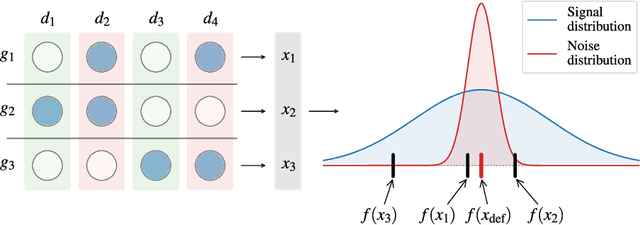

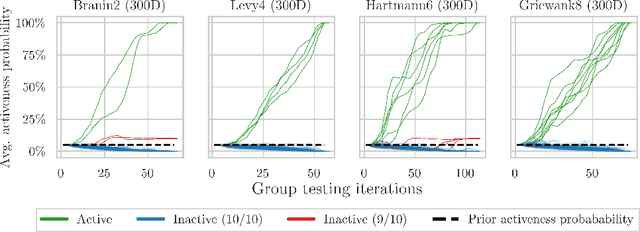

Abstract:Bayesian optimization is an effective method for optimizing expensive-to-evaluate black-box functions. High-dimensional problems are particularly challenging as the surrogate model of the objective suffers from the curse of dimensionality, which makes accurate modeling difficult. We propose a group testing approach to identify active variables to facilitate efficient optimization in these domains. The proposed algorithm, Group Testing Bayesian Optimization (GTBO), first runs a testing phase where groups of variables are systematically selected and tested on whether they influence the objective. To that end, we extend the well-established theory of group testing to functions of continuous ranges. In the second phase, GTBO guides optimization by placing more importance on the active dimensions. By exploiting the axis-aligned subspace assumption, GTBO is competitive against state-of-the-art methods on several synthetic and real-world high-dimensional optimization tasks. Furthermore, GTBO aids in the discovery of active parameters in applications, thereby enhancing practitioners' understanding of the problem at hand.
Bounce: a Reliable Bayesian Optimization Algorithm for Combinatorial and Mixed Spaces
Jul 02, 2023



Abstract:Impactful applications such as materials discovery, hardware design, neural architecture search, or portfolio optimization require optimizing high-dimensional black-box functions with mixed and combinatorial input spaces. While Bayesian optimization has recently made significant progress in solving such problems, an in-depth analysis reveals that the current state-of-the-art methods are not reliable. Their performances degrade substantially when the unknown optima of the function do not have a certain structure. To fill the need for a reliable algorithm for combinatorial and mixed spaces, this paper proposes Bounce that relies on a novel map of various variable types into nested embeddings of increasing dimensionality. Comprehensive experiments show that Bounce reliably achieves and often even improves upon state-of-the-art performance on a variety of high-dimensional problems.
Increasing the Scope as You Learn: Adaptive Bayesian Optimization in Nested Subspaces
Apr 22, 2023



Abstract:Recent advances have extended the scope of Bayesian optimization (BO) to expensive-to-evaluate black-box functions with dozens of dimensions, aspiring to unlock impactful applications, for example, in the life sciences, neural architecture search, and robotics. However, a closer examination reveals that the state-of-the-art methods for high-dimensional Bayesian optimization (HDBO) suffer from degrading performance as the number of dimensions increases or even risk failure if certain unverifiable assumptions are not met. This paper proposes BAxUS that leverages a novel family of nested random subspaces to adapt the space it optimizes over to the problem. This ensures high performance while removing the risk of failure, which we assert via theoretical guarantees. A comprehensive evaluation demonstrates that BAxUS achieves better results than the state-of-the-art methods for a broad set of applications.
* 28 pages, 8 figures. Accepted to NeurIPS 2022. This is the revised version and includes the appendix
 Add to Chrome
Add to Chrome Add to Firefox
Add to Firefox Add to Edge
Add to Edge